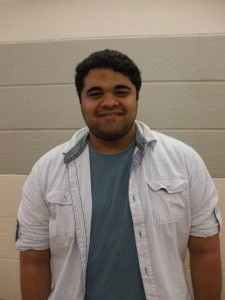
Alexavier Estrada came to UConn as an undergraduate with his heart set on medical school. But as he followed that dream, he began to have doubts.
For one thing, he wanted a profession that would let him spend more time with his loved ones. And as he became involved in laboratory research, he discovered something else: “I really enjoyed working with a tight-knit group of like-minded individuals trying to push the boundaries of science,” he says. “I want to expand the pool of scientific knowledge, as opposed to just utilizing it to help patients.”
Then he enrolled in an introductory psychopharmacology course called Drugs and Behavior taught by Dr. John Salamone. He characterizes the class as “an unexpected gift.” It not only tied together the physiology, biochemistry and general chemistry courses he had previously taken, but it also helped him realize that he could help people through teaching instead of healing them as a medical doctor, he explains.
Now Alex is pursuing his Ph.D. in Pharmaceutical Sciences with a concentration in Medicinal Chemistry. His research involves synthesizing compounds to improve and expand the class of antibiotics known as dihydrofolate reductase inhibitors. He will be the first person in his family to earn a doctoral degree.
Even before beginning his Ph.D. work, the young man from Broad Brook, CT, had considerable research experience under his belt. As an undergrad, he worked as a research assistant in the Behavioral Neuroscience division of the Psychology Department under Dr. Salamone, where he prepared his honors thesis: Effort-Impariment and Depression Mimicry Produced by Interleukin l-beta.
When Alex graduated with a B.S. degree in Biological Sciences from UConn in May 2013, he was a full year younger than most of his classmates. He skipped a grade in elementary school. He was also a Louis Stokes Alliance for Minority Participation (LSAMP) Scholar and one of the 15 members of his class to be awarded a Day of Pride Scholarship, which offers full tuition, room and board.
Although he changed his mind about being a doctor, he says, “Science has always been my focus and passion for as long as I remember. There was never any thought of working and studying in any other field.”
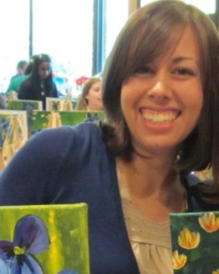
Andrea Kadilak is originally from Syracuse, New York and received her B.S. in Chemical Engineering at Worcester Polytechnic Institute in Worcester, Massachusetts. She began at the University of Connecticut in August 2010 and is pursuing a PhD in Chemical Engineering. She works under Dr. Leslie Shor researching the applications of microfluidic devices in the field of soil ecohydrology to improve estimations in global climate modeling. In her spare time, she enjoys playing and listening to music, reading, cooking, and drawing. When the weather is nice and she’s not in lab, Andrea also enjoys bicycling, rock climbing, camping, and hiking with her dogs.

Brian Cruz completed his undergraduate study in Environmental Engineering at the University of California Riverside. There he worked on a variety of research projects with Dr. Sharon Walker including nanoparticle impacts on a model human gut and septic tank performance, and impacts of disinfectants on bacteria viability, virulence, and attachment to spinach. He also worked with Dr. Kawai Tam and Dr. David Cocker on developing a novel air pollution technology for lawn mowers (http://nox-out.com/). He began study and research at the University of Connecticut in 2014 and is pursuing a PhD in environmental engineering.
He is currently working with Dr. Leslie Shor to develop a novel soil transport system utilizing soil microorganisms to deliver beneficial bacteria and other agricultural payloads to actively-growing plant roots. Targeted delivery and controlled release of these payloads may have large implications for the agricultural industry. His research interests include engineering microbial systems, and understanding the fate and impacts of emerging contaminants in microbially active systems.
Brian enjoys cooking, fishing and hiking in his spare time.
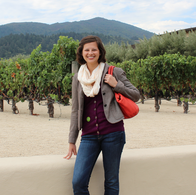
Christine Endicott is a first year Ph.D. student in Chemical Engineering. She received her B.S. degree from the University of Connecticut in Chemical Engineering and her M.S. from Cornell University. After a few years working in the biopharmaceutical industry, she is returning to UConn to study methods to evolve drugs to combat drug resistant bacterial infections. In her free time, Christine enjoys traveling, reading, and watching Huskies Basketball.
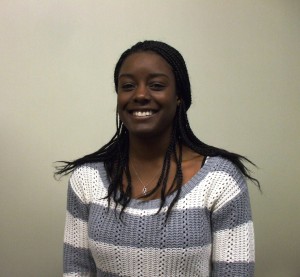
When Deborah Dorcemus was little, she wanted superpowers so she could save the world. Her goals today have changed…but not that much. She still wants to save the world. Only now she wants to do it through biomedical engineering.
Deborah is currently conducting research on osteochondral (bone/cartilage) repair with UConn Health Center’s Institute for Regenerative Engineering, where she completed an internship as an undergrad.
“For many physicians the repair of the bone/cartilage interface is still a challenge,” she says. “For the next few years I will spend my time learning more about this interface, and will hopefully design a method of regeneration that could help optimize recovery.”
Although her graduate studies keep her busy, she still finds time to serve as a mentor for the School of Engineering’s First in Family Energy Scholars program. Her other hobbies include running, hiking, and cooking.
As an undergrad, the Danbury, CT, native was active in the National Society of Black Engineers (NSBE), serving as secretary, vice president, and president. During that time she also took part in two research internships at Danbury Hospital.
Deborah’s pursuit of a career in health care began back in high school, where she completed a Certified Nursing Assistant program. Still interested in medicine, she is now focusing on how it can be combined with technology to develop health-care solutions.
Today when you ask her what she wants to be when she grows up, she’ll tell you about her plans to save the word, “one solution at a time.”
Biography done by Cathleen Torrisi

Javier Duluc is a first year PhD from Hamden, CT. He received his B.S. in Civil Engineering from the University of Connecticut and his research includes designing a hybrid re-centering steel moment frame system to mitigate the effects of earthquakes on structures. His interest in civil engineering came through his visits to construction sites with his father who was a civil engineer and worked as a construction inspector in Puerto Rico. He enjoys cooking, tasting different cuisines, reading, playing tennis, and spending time with family.
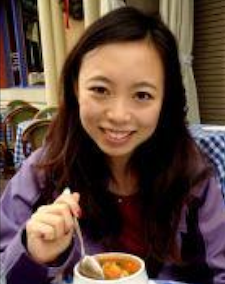
Lu Han attended Cheshire high school in CT and completed her B.S. here at Uconn. She is now a Chemical Engineering PhD student and her hobbies include running, playing ping-pong and traveling.
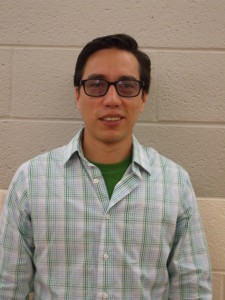
When Manuel Rivas was just 15, his father lost a hard-fought battle with cancer. As the oldest child, Manuel promised his father to take care of the family and to make him proud. By pursuing his Ph.D., he plans to make good on both of those promises.
Manuel is currently working on research that pushes Atomic Force Microscopy (AFM) to new limits. He is attempting to measure the force of medicinal radiation particles using AFM, something that has never been done before.
“It is my hope that my research will help make radiation therapy more effective and less damaging to the patient,” he explains. His father’s battle with cancer was his inspiration.
Manuel is already breaking AFM boundaries. “I would really like to break medical boundaries as well,” he says.
He hopes to do that in a few ways—1) By determining how much radiation energy gets absorbed by the cancer cell and how much of that energy is damaging healthy cells, and 2) By using AFM to watch what happens to cells when exposed to radiation in real time.
From McAllen, Texas, Manuel served his country in the U.S. Marine Corps before earning his bachelor’s degree in physics at the University of Texas Pan American in May, 2012. While at UT-Pan Am, he was president of the Phi Kappa Theta fraternity, the Society of Physics Students, and the Aikido Club.
Since coming to UConn, Manuel has put his skill with an atomic force microscope to use in several research projects, including his groundbreaking work with radiation. He has also been working with the Army Research Lab using AFM to measure microelectromechanical systems for potential use in the military. In addition, he worked on a team trying to develop a nanoparticle-based drug delivery system to eliminate cancer stem cells. And he has been using high-speed AFM (in fact, the fastest in the nation) to image magnetic information in hard drives in an effort to optimize their performance.
Although plenty busy in the lab, Manuel is also a member of the Materials Research Society, the American Ceramics Society, and the Gamma Sigma Alpha National Academic Greek Honor Society. In his free time, he enjoys riding his motorcycle, playing guitar, reading and drawing.
In addition to continuing his work in cancer research, Manuel’s long-term goals involve inspiring young people to pursue careers in the STEM fields.
“The world needs more bright young minds to go into the sciences to tackle humanity’s biggest problems,” he relates.
Earning his Ph.D. will allow him to accomplish those goals—and keep the promises he made to his father.
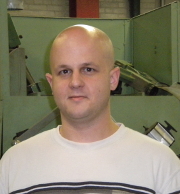
Martin Huber is a second year Ph.D. student in Mechanical Engineering. When he was a kid, he had a tendency to want to take things apart and figure out how they worked, which he still hasn’t quite outgrown. As a Master’s student, his thesis research focused on mechanisms, machine design, and mechatronics. In his free time, he enjoys playing guitar and watching Red Sox baseball.
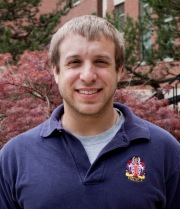
Matthew Eschbach is a second year graduate student in Mechanical Engineering. He received his B.S. degree from the University of Connecticut in Biomedical Engineering. His studies are focused in the field of robotics, specifically robots that interact and directly assist humans. Throughout his life he has always been fascinated by machines and science fiction which is what sparked his interest in the field of engineering. In his free time he enjoys being outside where he mountain bikes, hikes, and relaxes with a day at the beach. He also loves football and baseball and diligently follows the Mets and the Jets.
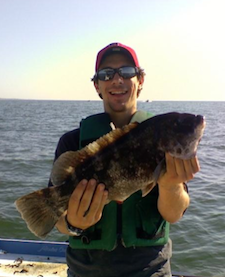
Michael Zilm is from Hamden, Ct and holds a B.S. degree from UConn. He is now a PhD candidate here in the department of Material Science and Engineering, researching materials for bone regeneration and drug delivery. He loves fishing, hiking, running, and sports in general.
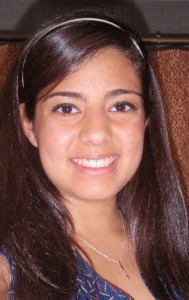
Neila Seda, working on sediment biouptake of silver nanoparticles to address toxicity and bioaccumulation in worms Neila Seda loves research—especially research on water quality. She is looking into the way ultrafine particles of silver build up in the soil and the toxic effects of that buildup on worms. This project, she explains, has potential impact on our water supply because nanometal particles can affect the toxicity of water. Neila’s interest in her research subject grew out of undergraduate research she conducted at Iowa State University, where she earned her B.S. degree in civil engineering in May on a full-tuition scholarship. As an undergrad, Neila also conducted laboratory and field research on the environmental impact of different crop systems, as well as on fluid interaction. It was an NSF-sponsored summer internship in the Materials Science and Engineering Department at Carnegie Mellon University after her sophomore year that originally got her hooked on research. She worked on making fine scale ceramic structures by freeze casting. “I would not trade this experience for any other,” she says, “because it made clear what I wanted to do after graduating—research.” Today, when she isn’t busy with her research, Neila is active in the marketing committee for the national Society of Hispanic Professional Engineers (SHPE). The native of Guaynabo, Puerto Rico, served as both president and secretary of the Iowa State chapter of SHPE/MAES (Society of Mexican American Engineers and Scientists) and was vice president of the university’s Puerto Rican Student Association. In her free time, Neila also stays in shape by playing racquetball and swimming, and enjoys trying new restaurants. After earning her Ph.D., she plans to work toward making “potable water more abundant and accessible to everyone.” Biography done by Cathleen Torrisi
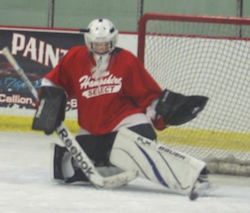
Rebecca Rubenstein, studied Environmental Engineering with a focus on water and wastewater treatment at the University of New Hampshire. She is studying Chemical Engineering at UConn and in her free time enjoys watching and playing hockey, reading, playing video games, and partaking in just about any outdoor activity.
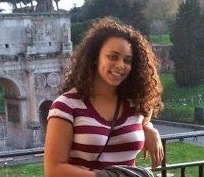
Stephany Santos, a current PhD student from Middletown, CT, graduated with a B.S in Biomedical Engineering from UConn. This past year she participated in the FIPSE Atlantis Exchange Program with the Politecnico di Milano (Italy) and Universidad Politecnica de Madrid (Spain), where she pursued her M.S. in Mechanical Engineering. Now she is back at UConn focusing her efforts in Biomechanics, concentrating on the Virtual Design, 3D Rendering and Rapid Prototyping of products to better the lives of individuals with physical disabilities. Her hobbies include cooking, traveling, sports, and trying new things.
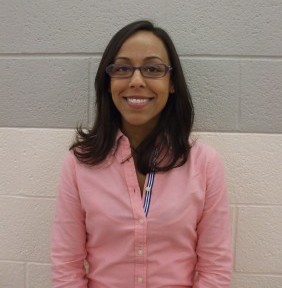
Yomery Espinal grew up in Washington Heights in the Bronx, where a passion for science, she says, was not exactly the norm. It was during her years at the Bronx High School of Science that she fell in love with chemistry.
That love affair with science led her to earn dual bachelor’s degrees in 2009—one in chemistry from Fordham University and one in chemical engineering from Columbia University.
With those degrees in hand, Yomey accepted a job at Columbia University Medical Center, where she conducted research on diabetes and obesity. Her research led to three publications. While working full time, she earned a master’s degree in chemistry from City College of New York in 2013.
From there, Yomey followed her passion for science to UConn. She is now enrolled in a Ph.D. program in material science and engineering. She is still working out the details of her thesis research.
“Material science is the balance I had been searching for between chemistry and engineering,” she shares. “I want to work on materials with applications that will help society and make people’s lives easier.”
In her free time, Yomey enjoys yoga, cooking and spending time with her dog. She is a UConn Multicultural Scholar and would like to get involved in mentoring young minority women.
“I have a feeling of responsibility for other young people with a similar story to mine who did not have the same opportunities I have had,” she says.
Yomey’s ultimate goal is to teach and conduct research at university level.
“I want to leave my mark in the world by passing on my knowledge and love of chemistry and material science through teaching,” she says. “I eventually would also like to be an advocate for underrepresented minorities pursuing higher education.”